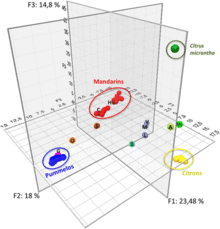Citrus subg. Papeda
| Papeda | |
|---|---|
 | |
| Ichang papeda | |
| Scientific classification | |
| Kingdom: | Plantae |
| (unranked): | Angiosperms |
| (unranked): | Eudicots |
| (unranked): | Rosids |
| Order: | Sapindales |
| Family: | Rutaceae |
| Genus: | Citrus |
| Subgenus: | Papeda |
| Species | |
|
15, see text. | |
Papeda is a subgenus of the genus Citrus native to tropical Asia. It includes the Ichang Lemon, yuzu, kaffir lime, kabosu, and sudachi, and a number of wild and uncultivated species and hybrids.
Papeda is the most primitive group of citruses. Because of generally slow growth and bitter, less palatable fruits than in other citruses, its species had only limited commercial cultivation. Some species, like Ichang papeda, are used in landscaping, while others are important for rootstocking and as genome source for breeding disease-resistant and frost-hardy citrus hybrids.[1]
It is believed, based on molecular studies, that the citron, pomelo, mandarin and papeda were the ancestors of all other citrus species and their varieties, which resulted from breeding or natural hybridization among the parental species.[2]
Classification
Species

The subgenus includes cultivated plants such as (believed hybrid parentage in parentheses):
- Ichang papeda
- Ichang lemon (pomelo x Ichang papeda)
- Yuzu (papeda x mandarin)
- Hyuganatsu (yuzu x pomelo, or yuzu sport)
- Kaffir lime or Mauritius papeda
- Kabosu (ichang papeda x bitter orange)
- Sudachi (ichang papeda x mandarin orange)
and a number of wild and uncultivated species and hybrids, including:
- Citrus celebica (Celebes papeda)
- Citrus halimii (Mountain citron)
- Citrus latipes (Khasi papeda)
- Citrus longispina (Winged lime)
- Citrus macrophylla (Alemow)
- Citrus macroptera (Melanesian papeda)
- Citrus micrantha (Biasong)
- Citrus micrantha var. microcarpa (Samuyao)
- Citrus webberi (Kalpi)
Notes
- ↑ Dr. Daniel Jacob (30 June 2014). Citrus Fruits. Oxford Book Company. pp. 48–. ISBN 978-93-5030-190-6.
- ↑ "International Citrus Genomics Consortium". University of California.